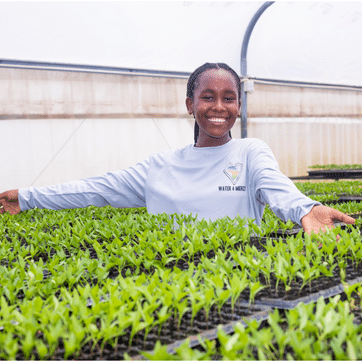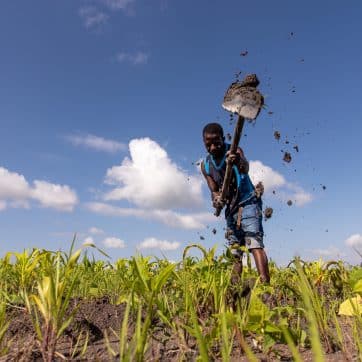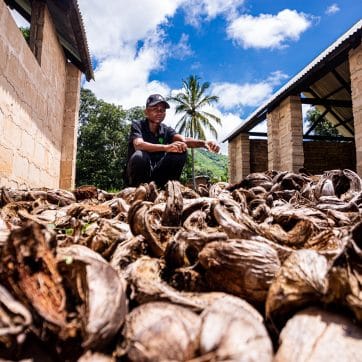
Enhancing Tanzania’s climate resilience through innovation
Tanzania is experiencing significant changes in climate, including rising temperatures, shifting rainfall patterns, prolonged drought and increased frequency of extreme weather events.
At the same time, there is a vibrant local ecosystem where innovative solutions are being developed to address these challenges.
There is an immense potential for improving the environment for these solutions to emerge, grow and thrive solving these challenges through enhanced collaboration and synergies between various stakeholders.
If you’re an innovator, entrepreneurship support organisation, NGO, policy maker, organisation or individual working on climate solutions in Tanzania, please register your interest to join the Cluster here:

What is the Adaptation Innovation Cluster about?
An innovation cluster is a collaborative ecosystem where a diverse range of participants work together on a common purpose to drive innovation and create lasting, impactful solutions. These clusters unite people from different backgrounds, sectors, and locations, promoting knowledge sharing, learning, networking, and connection. By forming a collaborative network that includes businesses, universities, entrepreneurs, investors, government agencies, and NGOs, innovation clusters can generate more ideas and solutions than any one entity could alone.
Our common purpose is to enhance the climate resilience of rural communities through collaboration and innovation. This includes creating an enabling environment that promote climate solutions throughout the country, stimulating the growth of new green start-ups, employment and investment.
Want to learn more about this project? Read our Information Document or Theory of Change.

Our approach to the Adaptation Innovation Cluster
- Building the Adaptation Innovation Cluster Ecosystem: Our approach to innovation clusters involves organising workshops and events that provide opportunities for people to gather and learn from each other. These sessions are designed to facilitate networking and collaboration, creating an environment where new ideas can flourish.
- Empowering Locally-Led Climate Innovations: We also focus on building locally embedded ecosystems that promote entrepreneurial activities and offer capacity-building support. This collaborative framework fosters the development of innovative solutions and serves as a hub for collaboration, ideation, and incubation of adaptation business models.
- Investing in the next generation: We aim to empower and amplify the voices of young leaders who are uniquely positioned to drive impactful and innovative initiatives addressing the pressing climate challenges facing the nation.
Empowering Locally-Led Climate Innovations
The Adaptation & Resilience ClimAccelerator in Tanzania is a specialised programme aimed at sparking innovation, driving growth, and scaling climate adaptation solutions from local start-ups. It offers 10 start-ups professional resources, knowledge, networks, and financial assistance to help them launch and scale their climate adaptation solutions effectively.
Read MoreClimathon is a global community of proactive individuals collaborating to advance the transition to a net zero-carbon, climate-resilient society, operating like a traditional hackathon, where teams brainstorm and develop solutions to climate-related challenges, with Climathon Dar es Salaam specifically focusing on using Data and AI to address climate adaptation issues.

Reaching rural communities
Agriculture is the backbone of Tanzania’s economy. However, small-scale farmers, who constitute the majority of agricultural production, face significant climate risks due to increasingly frequent droughts, floods, and other extreme weather events. These conditions can exacerbate poverty and increase food insecurity among rural communities heavily dependent on agriculture.
Although adaptation solutions are crucial to countering these risks, there is still a gap in effectively delivering these solutions to the most vulnerable rural communities and ensuring they take root. Addressing this gap is critical, as it directly impacts the ability of these communities to navigate climate change risks. This involves a continuous effort to gather and learn from local knowledge and experiences, along with exploring the relationship between local communities and the private sector. By doing so, we can equip these communities with the essential tools needed to build climate resilience and foster adaptation in the face of ongoing climate challenges.
Examples of innovative adaptation solutions that address climate impacts for rural communities include:
- Crop Insurance and Weather Index: A tool for stabilising farmer’s income by providing timely pay-outs directly linked with weather parameters.
- Digital Agriculture Platform: Agri-tech approach to crowdfunding, matching investors with smallholder farmers.
- Solar-Powered Pumps: Increases crop yields while conserving water and fuel. The pumps also reduce carbon emissions and pollution from diesel generators.

This initiative is made possible thanks to funding from the Department of Foreign Affairs of Ireland (Irish Aid). Since 2019 Irish Aid’s funding has fuelled our Global South entrepreneurship initiatives. This partnership drives worldwide climate action, leveraging public funds to engage the private sector, aligned with Ireland’s climate finance goals. In Tanzania, we collaborate with the Embassy of Ireland in Dar es Salaam to ensure a strong and aligned partnership.

